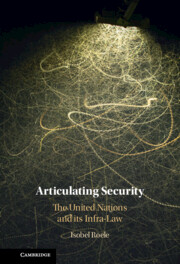Book contents
- Articulating Security
- Articulating Security
- Copyright page
- Contents
- Acknowledgements
- Additional material
- 1 Introduction
- Part I The UN’s Mechanics of Managerial Governance
- Part II The Stakes for Law: Between Compositional Articulation and the Articulation of Injustice
- 5 Infra-law
- 6 Anti-law
- 7 Uncanny Law
- Select Bibliography
- Index
5 - Infra-law
from Part II - The Stakes for Law: Between Compositional Articulation and the Articulation of Injustice
Published online by Cambridge University Press: 03 March 2022
- Articulating Security
- Articulating Security
- Copyright page
- Contents
- Acknowledgements
- Additional material
- 1 Introduction
- Part I The UN’s Mechanics of Managerial Governance
- Part II The Stakes for Law: Between Compositional Articulation and the Articulation of Injustice
- 5 Infra-law
- 6 Anti-law
- 7 Uncanny Law
- Select Bibliography
- Index
Summary
Chapter five discusses the UN’s articulated security project in relation to the concept of legalization. Legalization, whether pinned to an idea of positive doctrinal law or constitutional law, makes law into a continuum that effaces the distinction between juridical and managerial modes. This chapter reinstalls the distinction using infra-law to explore the phenomena described in Part One in terms of interlegality. In a post-Millennium global context, Foucault’s concept of infra-law mutates and the simple situation of interlegality he described in nineteenth-century French prisons, whereby discipline gathers beneath juridical droit, no longer pertains. The chapter describes infra-law as an entangled form of interlegality, whereby juridical forms also collect beneath managerial frameworks, but says that international lawyers have persisted in seeing managerial forms as waystations or helpmeets to juridicism. Using Freud’s distinction between associations of resemblance and associations of contiguity, the chapter explains the alchemy that leads international lawyers to misrecognize managerial technologies as juridico-political instruments.
- Type
- Chapter
- Information
- Articulating SecurityThe United Nations and its Infra-Law, pp. 123 - 155Publisher: Cambridge University PressPrint publication year: 2022



